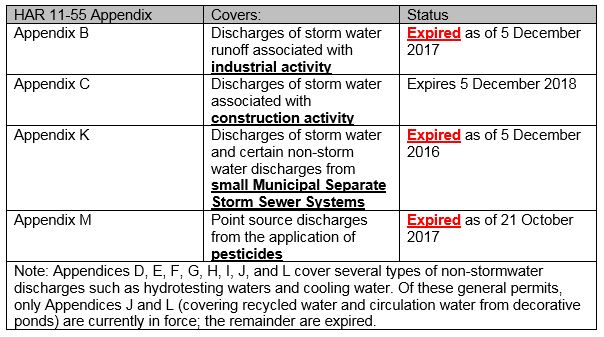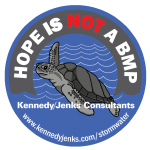Clients often find general permits to be a straightforward means of obtaining National Pollutant Discharge Elimination System (NPDES) coverage. However, several Hawaii stormwater general permits have expired, leaving facilities in a difficult position. Continue reading for an overview of general permits, an update on the status of Hawaii’s stormwater general permits, and a discussion of options for facilities facing an expired general permit.
What is a NPDES General Permit?
A NPDES general permit is a permit issued as a rule or document that authorizes a category of discharges from a category of sources within a geographical area. They are typically a cost-effective option for permitting agencies because of the large number of facilities that can be covered under one permit. In Hawaii, stormwater general permits are usually only issued for Class 2 or Class A receiving waters (defined further in Hawaii Administrative Rules Chapter 11-54). The filing fee is $500, and no public notice or comment period is required. Coverage under a general permit is obtained by filing of a notice of intent application and general permits are typically renewed every five years. If paperwork and documentation are submitted properly, permit issuance tends to be faster than an individual permit (discussed further below).
Which Hawaii Stormwater General Permits Have Expired?
The State of Hawaii Department of Health (DOH) is delegated by the U.S. Environmental Protection Agency (EPA) to administer the NPDES permit program in Hawaii. The NPDES permit program is described in and administered through the Hawaii Administrative Rules (HAR), Chapter 11-55, entitled “Water Pollution Control”. Appendices B through M of HAR, Chapter 11-55 are NPDES General Permits authorizing certain discharges/activities. Listed below are those general permits covering stormwater discharges:
Those who held general permits on the date of expiration should have been granted an administrative extension if they submitted a Renewal Notice of Intent form. The administrative extension requires that the permittee comply with the expired general permit during the pendency of the new general permit. The administrative extension terminates after the new general permit is adopted.

Options for New Dischargers: Individual Permit
If new dischargers need NPDES coverage before the new general permits are renewed they must pursue an individual permit. An individual permit is a customized NPDES permit that can combine multiple discharge types. An individual permit is specifically tailored to an individual facility/municipality. Upon receiving the appropriate application form(s), the permitting authority develops a permit for that facility/municipality based on information from the permit application and other sources (e.g., previous permit requirements, discharge monitoring reports, technology and water quality standards, total maximum daily loads, ambient water quality data, special studies). The permitting authority then issues the permit to the facility/municipality for a specific period, not to exceed 5 years, with a requirement to reapply before the expiration date.
In Hawaii, individual permits are usually only issued for Class 1 or Class AA receiving waters (defined further in Hawaii Administrative Rules Chapter 11-54) or when combining multiple discharge types in a permit. The filing fee is $1000 and the permit requires a public notice (additional cost) and 30-day comment period. Stakeholder input via the public notice can sway permitting requirements or potentially cause denial of the individual permit. Stakeholders may include non-profit organizations, state agencies, and concerned citizens.
Final Thoughts
KJ staff in our Honolulu and Wailuku offices closely track the status of Hawaii’s NPDES stormwater general permits and stay in contact with DOH on behalf of our clients. We comment on proposed revisions to these permits and help our clients plan for upcoming permit changes. Finally, we help clients obtain general and individual permit coverage when necessary. Contact us for more information on how we can help obtain and stay in compliance with your NPDES permit.
If you are interested in more information on Kennedy Jenks, don’t forget to subscribe to our blog!


